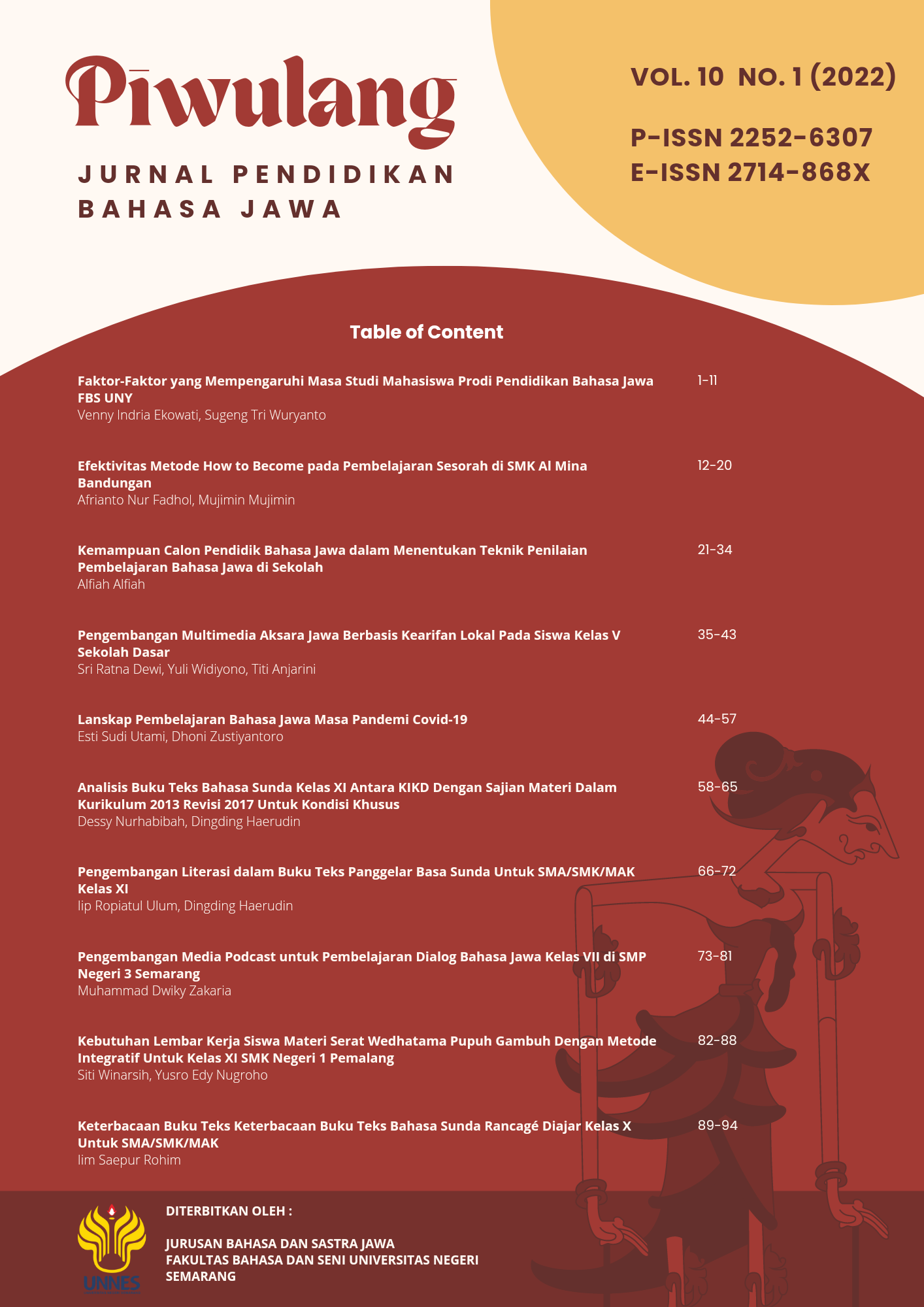Kemampuan Calon Pendidik Bahasa Jawa dalam Menentukan Teknik Penilaian Pembelajaran Bahasa Jawa di Sekolah
##plugins.themes.academic_pro.article.main##
Abstract
Educational assessment is a process of collecting and processing information to measure the achievement of student learning outcomes. An assessment process that is carried out properly can have an impact on the learning process and can be a reference in determining further policies. The accuracy of the selection of the assessment method will greatly affect the objectivity and validity of the assessment results which in the end are objective and valid information on the quality of education. On the other hand, errors in selecting and applying assessment methods also result in invalid information regarding learning and educational outcomes. One of the competencies that must be mastered by prospective educators is an understanding of the process of assessing student learning outcomes, both theoretically and practically. The purpose of writing this article is to describe the extent to which the objectives of the Java Language Learning Evaluation lecture have been achieved, particularly in learning outcomes to study and select assessment techniques based on the basic competencies measured. This research was conducted at PGRI University Semarang, with the data source being 19 students in the 4th (fourth) semester of the Regional Language and Literature Education Study Program. The data in this study is the ability of students to examine and select or determine assessment techniques based on the measured basic competencies. Data collection techniques used are test and non-test techniques. Based on the data that has been collected, it is analyzed using the interactive analysis technique of the Miles and Huberman model which consists of the stages of data reduction (data reduction), data presentation (data display), and conclusion drawing/verification. Meanwhile, to measure the achievement of the objectives of the implementation of the Javanese Language Learning Evaluation course, a goals-oriented program evaluation model was used. The results showed that most of the students had a good understanding of the application of various types of learning outcomes assessment techniques, namely 57.8% of students got a score of 100, 31.5% of students got a score of 94, 5.2% of students got 89 and 5, 2% of students got 78. Moreover, in the psychomotor or skill domain, the results showed that 41.2% of students got a score of 100, 42.1% of students got a score of 75, and 16% of students got a score of 50.
##plugins.themes.academic_pro.article.details##
References
Asropah, dkk. (2017). Kemampuan Menyusun Rencana Pelaksanaan Pembelajaran (RPP) Kurikulum 2013 Revisi 2017 Guru Bahasa Jawa Sekolah Menengah Atas (SMA) Kota Semarang. Jurnal Media Penelitian Pendidikan.
Dolong, H. M. J. (2016). Teknik Analisis dalam Komponen Pembelajaran. Jurnal UIN Alauddin, 5(2), 293–300.
Hutapea, R. H. (2019). Instrumen Evaluasi Non-Tes dalam Penilaian Hasil Belajar Ranah Afektif dan Psikomotorik. BIA’: Jurnal Teologi Dan Pendidikan Kristen Kontekstual, 2(2), 151–165. https://doi.org/10.34307/b.v2i2.94
Kamilati, N. (2018). Analisis Komponen Penilaian Pada Rencana Pelaksanaan Pembelajaran Sebagai Acuan Pengembangan Kurikulum Diklat Teknis Substantif Guru. EDUKASI: Jurnal Penelitian Pendidikan Agama Dan Keagamaan, 16(1), 1–17. https://doi.org/10.32729/edukasi.v16i1.440
Mujimin dan Bambang Indiatmoko. (2016). Seloka: Jurnal Pendidikan Bahasa Dan Sastra Indonesia, 5(1), 55–61.
Nisrokha. (2018). Authentic Assessment (Penilaian Otentik). Jurnal Madaniyah, 08(2), 209–229.
Novalinda, R., Ambiyar, A., & Rizal, F. (2020). Pendekatan Evaluasi Program Tyler: Goal-Oriented. Edukasi: Jurnal Pendidikan, 18(1), 137. https://doi.org/10.31571/edukasi.v18i1.1644
Nurani, N. I., Uswatun, D. azwar, & Maula, L. H. (2020). Analisis Proses Pembelajaran Matematika Berbasis Daring Menggunakan Aplikasi Google Classroom pada Masa Pandemi Covid-19. Jurnal PGSD, 6(1), 50–56. https://e-journal.umc.ac.id/index.php/JPS
Setiadi, H. (2016). Pelaksanaan Penilaian pada Kurikulum 2013. Jurnal Penelitian Dan Evaluasi Pendidikan, 20(2), 166–178. https://doi.org/10.21831/pep.v20i2.7173
Umi Salamah. (2018). PENJAMINAN MUTU PENILAIAN PENDIDIKAN. EVALUASI, 2(1), 274–293. http://content.ebscohost.com/ContentServer.asp?EbscoContent=dGJyMNLe80Sep7Q4y9f3OLCmr1Gep7JSsKy4Sa6WxWXS&ContentCustomer=dGJyMPGptk%2B3rLJNuePfgeyx43zx1%2B6B&T=P&P=AN&S=R&D=buh&K=134748798%0Ahttp://amg.um.dk/~/media/amg/Documents/Policies and Strategies/S
Permendikbud Nomor 66 Tahun 2013 tentang Standar Penilaian Pendidikan.
Permendikbud Nomor 53 Tahun 2020 tentang Penilaian Basil belajar oleh Pendidik dan Satuan Pendidikan pada Pendidikan Dasar dan Pendidikan Menengah.
